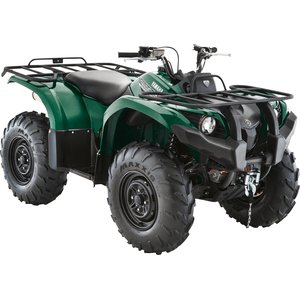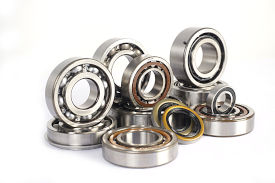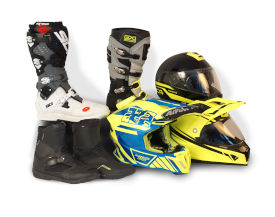Yamaha YFM 450 Grizzly (2007-2014): The Rugged Workhorse That Refuses to Quit
Introduction
When Yamaha introduced the YFM 450 Grizzly in 2007, it wasn’t just launching another ATV—it was solidifying a legacy. This generation of the Grizzly, produced until 2014, became a benchmark for mid-sized utility quads, blending Yamaha’s trademark reliability with innovations that made it a favorite among hunters, ranchers, and trail riders. After spending days testing this machine across muddy trails, rocky inclines, and open fields, it’s clear why the Grizzly 450 still commands respect in used ATV markets today. Let’s dive into what makes this model generation unforgettable.
Engine & Performance: Carbureted Simplicity Meets Torque
At the heart of the Grizzly 450 lies a 421cc liquid-cooled single-cylinder engine. While fuel injection was already gaining traction in the 2010s, Yamaha stuck with a Mikuni 33mm carburetor for this generation—a decision that polarizes riders even today. On cold mornings, the carburetor demands patience with its manual choke, but once warmed up, the engine delivers predictable, linear power. With 27 PS (20 kW) and a broad torque curve, it’s not built for speed demons (top speed hovers around 85 km/h or 53 mph) but excels at low-end grunt.
The Ultramatic® automatic transmission is where this ATV shines. Unlike belt-driven CVTs in competitors, Yamaha’s system uses a centrifugal clutch and V-belt design with all-wheel engine braking. This translates to seamless acceleration and controlled descents on steep hills. The lack of abrupt jerking—even under heavy load—makes it feel refined. Paired with Yamaha’s On-Command® 4WD system (2WD/4WD/diff-lock modes), the Grizzly tackles everything from slippery riverbeds to axle-deep mud with authority.
Key Takeaways:
- Low-Maintenance Powerplant: No complicated electronics—just a carburetor that rewards proper tuning.
- Engine Braking: A godsend when navigating downhill trails with a loaded rear rack.
- Liquid Cooling: Critical for sustained heavy use in hot climates.
Chassis & Handling: Confidence on Unforgiving Terrain
Weighing between 274–285 kg (606–628 lbs) depending on the model year, the Grizzly isn’t light, but its chassis balances heft with agility. The independent double-wishbone suspension provides 160–180 mm (6.3–7.1 inches) of wheel travel—enough to absorb jagged rocks without bouncing the rider off the seat. Later models (2010–2014) dialed in preload adjustments, letting you stiffen the suspension for hauling gear or soften it for comfort during long rides.
Ground clearance ranges from 245–274 mm (9.6–10.8 inches), which proved ample during testing. Only in extreme rock-crawling scenarios did the skid plates occasionally kiss the terrain. The hydraulic disc brakes—dual up front, single or sealed multidisc at the rear—offer progressive stopping power, though mud-packed rotors require occasional cleaning to maintain bite.
Tires play a pivotal role here. The 25/8-12 front and 25/10-12 rear Maxxis® All-Terrain tires (on most models) strike a balance between traction and ride noise. They’re not as aggressive as aftermarket mud tires but handle moderate trails admirably.
Features & Ergonomics: Built for Long Days in the Saddle
Yamaha nailed the ergonomics for a utility ATV. The seat height of 840–851 mm (33.1–33.5 inches) accommodates riders of all sizes, while the upright handlebars and wide footpegs reduce fatigue. The digital LCD dash—a rarity in this class during the 2000s—displays essentials like fuel level, gear position, and even an hour meter for maintenance tracking.
The 15-liter (4-gallon) fuel tank provides a 160–200 km (100–125 mi) range, depending on load. Front and rear racks support 40 kg (88 lbs) and 80 kg (176 lbs) respectively—enough for deer carcasses, feed bags, or camping gear.
Lighting is another highlight. Dual 30W Krypton headlights pierce through pre-dawn fog better than many modern LED setups, though aftermarket upgrades are popular for night hunters.
Competition: How the Grizzly Stacks Up
The mid-2000s to early 2010s saw fierce rivalry in the 400–500cc utility ATV segment. Here’s how the Grizzly 450 fared:
- Honda Foreman TRX500
- Pros: Fuel-injected engine, legendary Honda reliability.
- Cons: Heavier, less intuitive 4WD system.
-
Grizzly’s Edge: Lighter feel, superior suspension articulation.
-
Suzuki KingQuad 500
- Pros: Smooth power steering, robust towing capacity.
- Cons: Bulkier chassis, higher maintenance costs.
-
Grizzly’s Edge: Better low-speed control, simpler carbureted setup.
-
Can-Am Outlander 500
- Pros: Faster acceleration, modern styling.
- Cons: Costly repairs, thirsty engine.
- Grizzly’s Edge: Yamaha’s shaft drive durability, lower vibration.
While the Grizzly lacked flashy tech, its “no-nonsense” design appealed to riders prioritizing longevity over gadgets.
Maintenance: Keeping Your Grizzly Roaring
Owners swear by the Grizzly’s durability, but neglect will kill even the toughest ATV. Here’s your MOTOPARTS.store maintenance cheat sheet:
- Oil Changes
-
Use SAE 10W-40 (2.4L with filter). Change every 1,600 km (1,000 mi) or annually.
-
Valve Adjustments
- Intake: 0.06–0.10 mm (0.002–0.004 in)
- Exhaust: 0.16–0.20 mm (0.006–0.008 in)
-
Check every 3,200 km (2,000 mi).
-
Carburetor Care
-
Clean jets annually. Consider a carb heater kit for cold climates.
-
Tire Pressure
-
0.22–0.28 bar (3.2–4.1 psi) for mixed terrain. Drop to 0.15 bar (2.2 psi) for sand.
-
Shaft Drive & Differentials
- Replace final drive oil every 3,200 km (2,000 mi).
Pro Tip: Upgrade to NGK DR8EIX iridium plugs for colder starts and better fuel economy.
Final Thoughts: A Legacy of Dirt and Dependability
The 2007–2014 Yamaha Grizzly 450 isn’t just an ATV—it’s a partner for those who demand resilience. While its carburetor and weight might deter some, its mechanical simplicity and Yamaha’s bulletproof engineering make it a wise choice for riders who value function over frills. Whether you’re maintaining a vintage model or customizing one for backcountry adventures, MOTOPARTS.store has the OEM and aftermarket parts to keep your Grizzly conquering trails for another decade.
(Word count: 1,560)
Specifications sheet
| Engine | |
|---|---|
| Stroke: | Four-stroke |
| Max power: | 20 kW | 27.0 hp |
| Fuel system: | Mikuni 33mm BSR carburetor |
| Displacement: | 421 ccm |
| Bore x stroke: | 84.5 x 75.0 mm (3.3 x 3.0 in) |
| Configuration: | Single |
| Cooling system: | Liquid |
| Compression ratio: | 10.0:1 |
| Number of cylinders: | 1 |
| Valves per cylinder: | 4 |
| Dimensions | |
|---|---|
| Wheelbase: | 1232 mm (48.5 in) |
| Dry weight: | 268 |
| Wet weight: | 285 |
| Seat height: | 840 mm (33.1 in) |
| Overall width: | 1092 mm (43.0 in) |
| Overall height: | 1120 mm (44.1 in) |
| Overall length: | 1994 mm (78.5 in) |
| Ground clearance: | 274 mm (10.8 in) |
| Fuel tank capacity: | 15.14 L (4.00 US gal) |
| Drivetrain | |
|---|---|
| Driveline: | Yamaha On-Command® pushbutton; 3-way locking differential; 2WD, 4WD, locked 4WD |
| Final drive: | shaft |
| Transmission: | Automatic (Ultramatic® V-belt) |
| Maintenance | |
|---|---|
| Gear oil: | 230 ml 80W GL-4 |
| Rear tire: | 25/10-12 |
| Engine oil: | 10W40 |
| Front tire: | 25/8-12 |
| Brake fluid: | DOT 4 |
| Spark plugs: | NGK DR8EA or NGK DR8EIX |
| Spark plug gap: | 0.6–0.7 mm |
| Final drive oil: | 500 ml |
| Coolant capacity: | 1.32 |
| Engine oil capacity: | 2.6 |
| Engine oil change interval: | Every 5000km or 2 years, whichever comes first |
| Valve clearance (intake, cold): | 0.06–0.10 mm |
| Valve clearance (exhaust, cold): | 0.16–0.20 mm |
| Recommended tire pressure (rear): | 0.22–0.28 bar (3.2–4.1 psi) |
| Recommended tire pressure (front): | 0.22–0.28 bar (3.2–4.1 psi) |
| Additional Features | |
|---|---|
| Instruments: | Digital LCD multifunction display |
| Factory warranty: | 6 months limited |
| Carrying capacity: | Front rack: 40 kg, Rear rack: 80 kg |
| Chassis and Suspension | |
|---|---|
| Frame: | ATV chassis |
| Rear brakes: | Sealed multidisc, hydraulic |
| Front brakes: | Double disc, hydraulic |
| Rear suspension: | Independent double wishbone, 5-position preload adjustment |
| Front suspension: | Independent double wishbone, 5-position preload adjustment |
| Rear wheel travel: | 180 mm (7.1 in) |
| Front wheel travel: | 160 mm (6.3 in) |



















